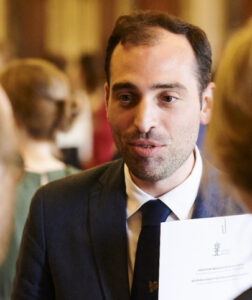IBDM welcomes motivated and talented students every year and offers them the opportunity to do thesis work in a dynamic and interdisciplinary environment. We support students to conduct independent research and to contribute to the advancement of knowledge in biology.
A look back at the latest students who have been promoted to doctor:
Manish Joshi
Manish spent 4 years in Julien Royet’s lab. His work focused on the interactions between prokaryotes and eukaryotes. These interactions are mediated by a molecular dialogue between microbial associated motifs (MAMP) and host pattern recognition receptors (PRR). Bacterial peptidoglycan (PGN) is a universal MAMP detected by PRR belonging PGRP proteins. Misdetection of microbiota-derived PGN is responsible for some forms of Crohn’s disease in patients. Whereas the signaling cascades activated following PGN/PRR interactions are well characterized, little is known about the subcellular events requires to translate these early sensing steps into downstream target gene activation. Using a model of Drosophila enteric infection, Manish showed that gut-associated bacteria can induce PGRP-LE intracellular aggregation. He found that these aggregates co-localize with the early endosome marker Rab5. His in vivo functional analysis demonstrates that whereas some PGRP-LE target genes can be activated independently of Rab5, other need the combine action of PGRP-LE and Rab5 to be transcribed. Manish’s results show how the same ligand/receptor interaction can differentially activated target genes dependent of its intracellular routing.
Paul de Boissier
Paul de Boissier defended his thesis in the end of November after 3 short, COVID-stricken years! Paul joined the lab as M2, and he was most interested in evolutionary biology. As a project, he decided to work on the evolution of protein motifs, the short little sequence stretches that all proteins need to interact with their environment. He asked the question, whether protein motif evolution is linked to the structural context of the protein region it lies in: is it more disordered, are protein motifs evolving more quickly? Apart from his main subject, Paul was to be found wherever an evolutionary question popped up. He for instance looked at the evolution of the large protein Titin together with the Schnorrer Team and, in a collaboration with the team of Tam Mignot, he also helped identify the components of the Kill system, a bacterial apparatus that is required for the predator Myxococcus xanthus to kill its prey. And finally, if you want to learn about orthology databases, where you can find the orthologs and paralogs of your favorite protein, you should read his review.
Mathieu Loizeau
Mathieu Loizeau defended his PhD on December 15 2022. He joined the Cremer team in 2019 with a PhD fellowship provided by the CENTURI Centre, working under the supervision of Jean-Claude Platel. His aim was to investigate the role of a subtype of olfactory bulb interneurons, glutamatergic external tufted cells, in the perception of odors. Using a complex approach, based on in vivo imaging directly in the living mouse brain, he demonstrated that this neuron type presents a wide spectrum of responses to different types of odors. Importantly, he found that these neurons are also progressively recruited as a function of odor concentration, and that this behavior is stable over time. This suggests the existence of a stable activity map on the olfactory bulb, that is specific for a given type and concentration of odor, providing an important step towards the understanding of how the brain deals with the various odors that our nose encounters every moment. Mathieu plans to continue his scientific career by doing a postdoc in a top-class international lab.
Océane Mercier
Océane Mercier defended her doctoral thesis on December 9, 2022 on the consequences of myelin alterations on cognitive functions following a transient episode of demyelination in adult mice. Myelin in the brain plays a crucial role in neural networks communication by promoting the conduction of electric signals. In the adult brain, the integrity and remodeling of myelin are important players in cognitive functions such as learning and memory. Océane joined the “Stem Cells and Repair” team of Pascale Durbec in 2018 for her M2 to develop behavioral tests to study the effect of myelin loss in a mouse model of Multiple Sclerosis. Océane’s thesis work focused on the study of the link between myelin alterations and cognitive functions. Océane combined behavioral, biochemical, histological and electrophysiological approaches in mice to demonstrate that demyelination of neuronal networks induces long-term cognitive deficits associated with alterations in regenerated myelin. These data are important because they help to understand why some patients with Multiple Sclerosis present cognitive deficits and especially memory problems. Following a clear and didactic oral presentation and a very interesting scientific discussion with the members of the jury, Océane was awarded the degree of Doctor of the University of Aix-Marseille. The jury congratulated her for the quality of her work and the richness of the discussion. Océane will stay a few more months at IBDM to finalize the publication of her work.
Jordan Molitor
Jordan Molitor obtained his PhD degree in Neuroscience on December 16, 2022, after 4 years spent at the IBDM working on mouse models of autism spectrum disorder (ASD) based on the conditional deletion of Tshz3, an ASD-linked gene. Jordan joined the IBDM as a M2 student in January 2019, when he started his training with Paolo Gubellini to achieve the Master degree in Neuroscience. He obtained a grant the same year to continue his work as a Neuroscience PhD student, under the supervision of Paolo Gubellini and Xavier Caubit, in the framework of a collaborative project involving Kerkerian-Le Goff and Fasano Teams. He is interested in ASD and, with his work, he contributed to discover new neuronal substrates of its symptoms. In particular, he showed that repetitive/stereotyped behaviors are linked to the dysfunction of the cholinergic interneurons of the striatum, the main input structure of the basal ganglia. He characterized how cholinergic interneurons are affected by Thsz3 loss in terms of their electrophysiological properties, topographic localization within the striatum and developmental origin, providing important information about ASD pathophysiology and opening several interesting perspectives for its treatment. In the future, Jordan would like to integrate the world of the pharmaceutical industry, to work in particular on psychiatric, neurodegenerative and neurodevelopmental disorders.




